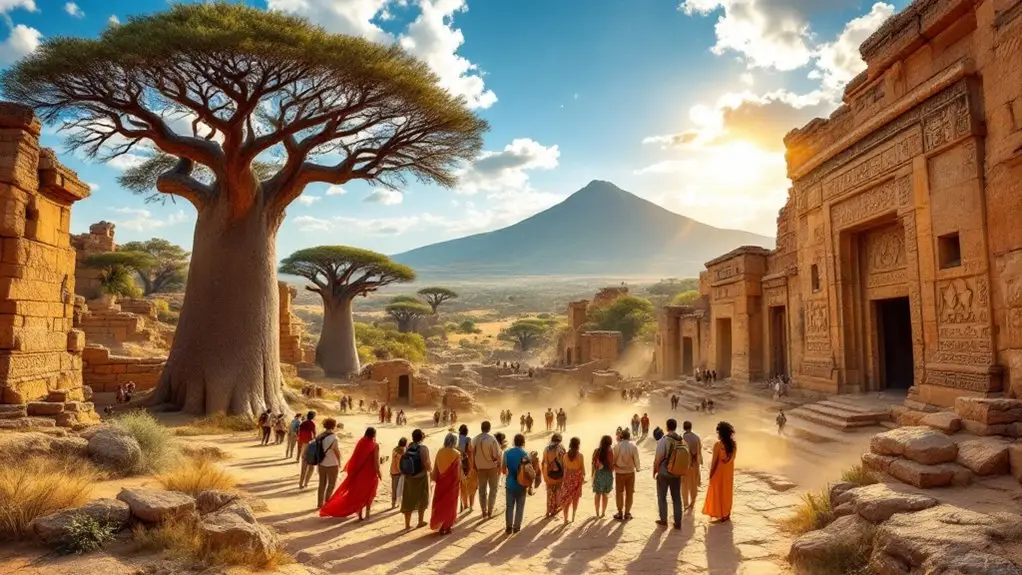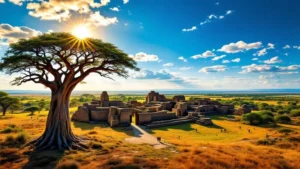When you're planning to explore Africa's historical heritage sites, it's essential to approach your journey with intention. Engaging with local communities not only enriches your experience but also uncovers narratives that guide you deeper into the culture. Additionally, practicing sustainable tourism guarantees that your visit supports both the environment and the local economy. But there's more to ponder, especially when it comes to choosing the right sites to visit. By focusing on lesser-known locations, you can uncover hidden gems that reveal a side of Africa's history often overlooked. What might you discover in these quieter corners?
Key Takeaways
- Research UNESCO World Heritage Sites to understand their cultural significance and historical context before visiting.
- Engage with local communities to gain authentic insights and support local economies through crafts and food purchases.
- Choose eco-friendly accommodations and participate in guided tours focused on heritage conservation to promote sustainable tourism.
- Adhere to site regulations and dress codes to show respect for local customs and traditions.
- Document your experiences through photography or journaling to reflect on the cultural insights gained during your visits.
Research and Prepare
When you're gearing up to explore Africa's historical heritage sites, diving into research and preparation is crucial. Start by familiarizing yourself with the UNESCO World Heritage Sites in the region, each brimming with rich stories and cultural significance. For instance, understanding the architectural marvels of the Pyramids of Giza or the rock-hewn churches of Lalibela enhances your appreciation of their heritage.
Next, investigate the specific regulations and dress codes tied to these sites. When visiting Lalibela's churches, for example, modest attire is a must to show respect for local customs. This attention to detail not only enriches your experience but also fosters a deeper connection with the culture.
Utilize guidebooks and travel blogs to pinpoint the best times to visit, guaranteeing you're set to witness natural wonders like Victoria Falls during the dry season for ideal viewing.
Don't forget to check for guided tour options, especially at places like Robben Island, where knowledgeable guides can provide invaluable context.
Lastly, research accessibility information, including transportation and accommodations, particularly for remote locations like the Great Zimbabwe Ruins, to guarantee a smooth and enjoyable journey.
Engage With Local Communities
Immersing yourself in local communities at Africa's historical heritage sites transforms your journey into a vibrant tapestry of culture and tradition. By engaging with these communities, you gain invaluable insights into their cultural practices and historical narratives.
Initiatives like the CTS Heritage Virtual Rock Art tours, which involve indigenous groups, illustrate the importance of preserving their heritage while allowing you to learn directly from those who lived it.
To deepen your experience, consider participating in:
- Culinary heritage experiences, such as Cape Malay cooking tours, where food tells stories of generations.
- Community-driven projects like digital mapping of ancient San and Khoi rock art, empowering locals to share their history.
- Local festivals, such as the National Arts Festival, where you can witness traditional arts and performances while supporting local livelihoods.
- Collaborating with local guides who can enrich your understanding of historical sites and provide economic benefits to their communities.
Practice Sustainable Tourism
Sustainable tourism embodies a commitment to preserving the rich tapestry of Africa's historical heritage while guaranteeing that local communities thrive.
To make a positive impact during your travels, choose eco-friendly accommodations that prioritize sustainable practices, like solar energy and water conservation. This not only minimizes your carbon footprint but also aligns with the ethos of responsible tourism.
As you explore heritage sites, support local economies by purchasing crafts and food from nearby vendors. This guarantees that tourism benefits the communities protecting these invaluable cultural landmarks.
Participate in guided tours that emphasize heritage conservation, enriching your understanding of the significance behind each site while helping preserve their integrity.
Always adhere to established guidelines at heritage sites—avoid littering and respect wildlife. Your actions contribute to the preservation of these environments for future generations.
Additionally, consider engaging in volunteer opportunities or community programs focused on heritage conservation. This hands-on experience allows you to make a meaningful impact while deepening your appreciation for Africa's historical heritage.
Frequently Asked Questions
How to Promote African Culture?
Promoting African culture starts with engaging in vibrant cultural festivals that showcase traditional crafts and indigenous languages.
You can participate in local events, where artisans display their work and storytellers share rich histories.
Support initiatives that teach these languages, preserving the essence of each community.
Which Country Has the Most World Heritage Sites in Africa?
You might think Egypt's monumental pyramids or Ethiopia's rock-hewn churches would lead the race, but South Africa surprises you with its ten UNESCO World Heritage Sites.
From the historic Robben Island to the stunning iSimangaliso Wetland Park, each site tells a unique story.
Nigeria's archaeological sites add to the continent's rich tapestry, yet it's South Africa that stands out as the country with the most heritage sites, preserving its vibrant cultural legacy.
Why Is It Important to Conserve South Africa's Heritage Sites?
Conserving South Africa's heritage sites is essential because of their cultural significance, reflecting the nation's history and diversity.
By preserving these landmarks, you support tourism, which boosts the economy and creates jobs for local communities.
However, you'll face preservation challenges, such as funding and maintenance.
Engaging with these sites not only deepens your understanding of the past but also fosters a sense of unity and reconciliation among South Africans, enriching everyone's experience.
What Are the Seven 7 Important Historical and World Heritage Sites That Can Be Found in Beijing?
"History is the best teacher." In Beijing, you'll discover remarkable historical sites that narrate China's rich past.
The Forbidden City, with its stunning architecture, served as the imperial palace for centuries.
The Great Wall stretches majestically, symbolizing strength and endurance.
Don't miss the Temple of Heaven, where emperors once prayed for abundant harvests.
Each site offers a glimpse into China's profound heritage, inviting you to explore and appreciate its cultural significance.
Conclusion
In your quest to uncover Africa's enchanting history, remember to connect with communities, celebrate sustainability, and seek out the lesser-known gems. By diving deep into diverse cultures and embracing eco-friendly practices, you'll not only enrich your own experience but also help preserve the precious past for future generations. So, step into the stories, savor the sights, and support the souls of Africa—your journey will be both meaningful and memorable!




